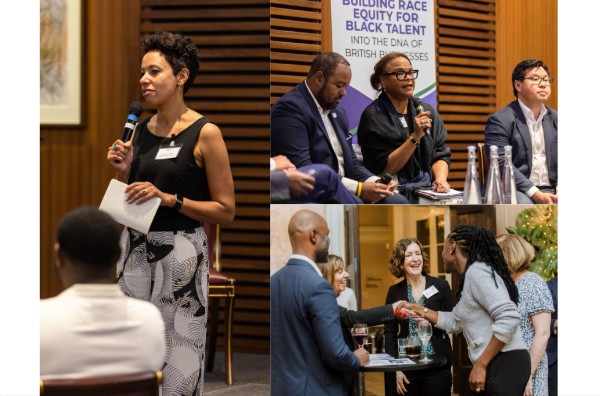
On 26 June, BTC's first C-suite readiness conference took place for emerging senior leaders. The day brought together a diverse group of executives with a shared desire, not just to rise to the top, but to understand what it truly takes to thrive at C-suite level.
Kindly hosted by The Leathersellers’ and supported by The Clothworkers’ Company, we welcomed over 50 senior executives from our Signatory organisations and partners for a day of candid and insightful discussion.
The series of panels and workshops were designed to develop socially responsible leaders, discussing the current key issues and challenges in the business world, and identifying pathways to individual and organisational success.
The outcome was the emergence of powerful stories, practical insights and personal strategies that painted a picture of leadership that is as much about mindset and having an understanding of one's own personal motivations and identity, as it is about strategic action.
With thanks to our speakers: Richard Iferenta, Dr Margaret Casely-Hayford CBE, Cliff Kamara; John Coburn, Sherine Mahmoud, Caroline Flanagan, David Ziyambi, Paul Drechsler CBE, Kamal Ahmed, Tim Soutphommasane; Tangy Morgan and Mark Martin. And to our sponsors The Lethersellers and The Clothworkers' Company.
Here are the five core themes that stood out:
At senior levels, leadership success depends not just on what you do—but on how well you know yourself and the context you’re operating in.
Self-awareness acts as an anchor. It helps you understand what energises and drives you, how to reset after setbacks, and when to pivot. One of the most critical strengths to cultivate is resilience - which is essential, not optional. This is helped by ‘strategic pessimism’ - being realistic about the internal obstacles we all carry as individuals, as well as external challenges, and building plans that account for them.
A broader hinterland—a life outside of work—strengthens this anchor. Family, friends, charity work, faith; all nourish your sense of purpose and offer essential perspective when professional challenges arise. When it’s tempting to become consumed by business demands, your home life often becomes your most important network—supporting your long-term wellbeing and separating your self-worth from your job title. That’s especially important in times of failure.
Being authentic is crucial, but situational awareness also means understanding how to ‘show up’ in the workplace. Many of us have heard the phrase "bring your whole self to work", but savvy leaders know to integrate personal and professional identities thoughtfully - considering when, where and how to do so.
"It’s not just what you know, but who you know—and how well you nurture those connections." This phrase came up time and again, and for good reason.
In leadership, it’s not just the extent of your network that matters—it’s the strength of your relationships. This is especially important when seeking a C-suite or board role. Like it or not, networking is unavoidable—but it must be relevant and aligned to your goals. Think: right industry, right level, right recruiter.
Beyond the practical, human connection is often what gets you shortlisted—and what makes you a successful leader once in post.
Making it to the boardroom isn’t an accident. It’s the result of strategic planning, thorough preparation, and resilience in the face of rejection.
Preparation means knowing what you want—and making sure others do too. Tailor your profile to reflect the roles you aspire to. Make sure your CV and LinkedIn profile are not just polished, but strategically relevant. When it comes to interviews, rehearse your story. Speak with clarity and enthusiasm. Don’t shy away from failures—use them to show growth. Read the company’s annual report and accounts. If a recruiter asks for salary information—tell them. If money isn’t discussed until the end, the whole process may turn out to be a waste of time.
Persistence means not settling for the first opportunity that comes along. Do your due diligence. Ask questions. Be deliberate.
Playing the game means understanding the rules, building relationships, and recognising that senior roles are rarely advertised—they’re discovered through persistence, presence, and preparation. It could take years to land your ideal role. Ask yourself: What positions do I need to take now to get to where I want to be?
C-suite roles today are not just about profitability—they’re about responsibility. Yet many organisations are still focused only on one to five years ahead. Long-term, strategic thinking is essential to address shifting demographics and global geopolitical changes that will reshape business.
Leaders must develop a clear personal stance on political and social issues. This takes courage—especially on topics like diversity, equity and inclusion (DEI) or global justice. But as one speaker said: “If you take on the leadership role, your duty is to lead.”
To meet the challenges of leadership, you must consider both your individual role and the broader political context. Your stance should align with the mission and culture you want to shape within your organisation. In increasingly polarised environments—particularly in the US—some organisations are choosing institutional neutrality. Yet, repositioning is possible. Language matters.
Furthermore, leadership means influence and influence carries responsibility. To lead well, future C-suite leaders must offer empathy, demonstrate emotional intelligence, and have the courage to speak up when faced with challenging decisions.
Finally, the impact of a leader, especially at C-suite level, cannot be underestimated. Those who reach this level must be forward-looking - considering both the current and future populations they serve - as well as having clear convictions. "Is it time to break the system or work within it?"
With AI, demographic shifts, and global uncertainty reshaping the business landscape, today’s leaders must continually reinvent themselves.
Leaders must embrace lifelong learning in order to stay ahead of the curve. With a constantly evolving tech landscape (especially AI), it is the board’s responsibility to upskill or have experts present. There’s a growing concern that AI could erode critical thinking, making human judgement and moral clarity even more vital.
The CEO of the future must be agile, courageous—and deeply human. Being “good with people” isn’t enough. You must understand them. Listening sensitively is essential.
This conference made one thing clear: C-suite leadership isn't a destination—it's a mindset. It’s about cultivating the clarity, courage, and connection needed to lead in a fast-changing, complex world.
To get there, emerging leaders must be intentional—about who they are, what they want, and how they lead others toward a shared future.
Written by




